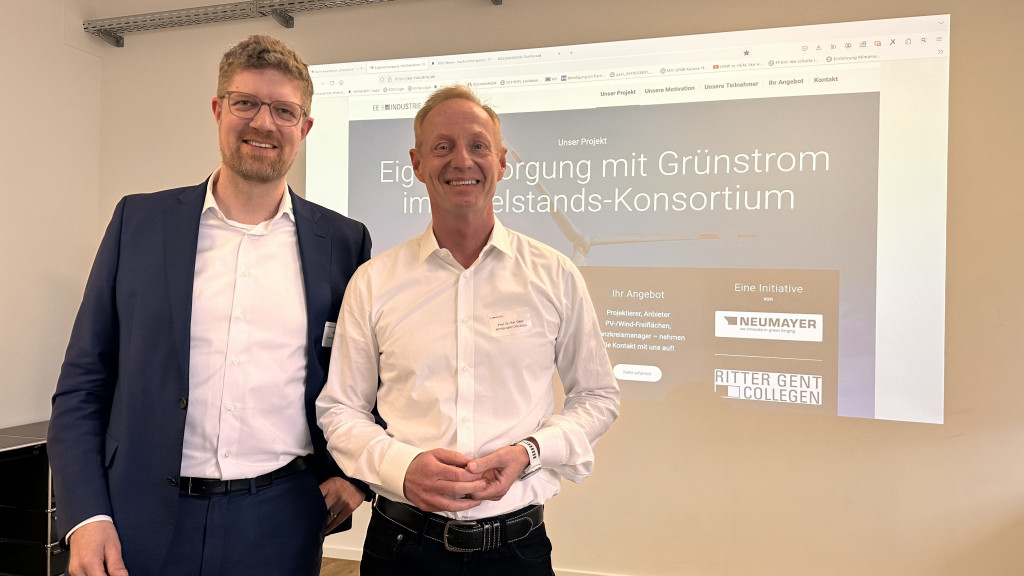Network Meeting of the EE-Industrie Initiative
“Mastering the energy transition together and fully exploiting the potential of renewable energies!”
At the end of January, we took part in the network meeting of the EE-Industrie Initiative in Hanover, which impressively demonstrated the great interest of the German industry in renewable energies and innovative solutions for energy generation and use. Despite the regulatory and economic challenges, an optimistic mood prevailed among the participants. The program included topics such as:
- Grid connection and regulatory issues
- Large-scale battery storage as a new revenue option
- Political framework conditions and the future of the EEG
- Strategies for reducing electricity costs through smart technologies and PPAs (Power Purchase Agreements)
- Legal developments and effects of the ECJ ruling on grid fees
Challenges and opportunities
According to the Bundesnetzagentur, there were negative wholesale electricity prices in 457 out of 8784 hours in the leap year 2024. In the previous year 2023, there were 301 out of 8760 hours. Negative electricity prices are on the rise and require new business models. Companies must increasingly look at intelligent consumption strategies.
Although large battery storage systems could contribute to grid stabilization, there are connection problems in this area, as many grid operators consider battery storage systems to be too much of a burden on the grids. Large-scale storage systems could temporarily store surplus electricity and feed it into the grid at times of high load. However, the challenges are the high acquisition costs and the fact that business models for grid-supporting storage applications are not yet established. In addition, there is no standardized planning of storage solutions in the grid architecture, which leads to delays in approval.
The regulatory uncertainties for self-supply projects lead to justified fears that grid charges will be extended to self-supply models, which makes onsite PPAs in particular economically unattractive, even though they offer companies greater independence from market price fluctuations. In addition, there are complex contractual structures that make long-term planning security more difficult.
AI will also play a role in the energy industry in the future. The company neustrom presented a solution that uses artificial intelligence to optimize consumption forecasts and thus avoid peak loads. The AI analyzes market prices, weather data, and the energy requirements of companies in real time and ensures more intelligent control of battery storage systems. This leads to more efficient use of renewable electricity and can reduce costs.
Consortia can offer an opportunity. If companies join forces, they can achieve advantages in terms of grid fees by purchasing electricity together. This creates new business models that minimize energy costs and enable better use of renewable energies.
So far, politicians have not presented a clear strategy on how to proceed with the promotion of renewable energies after the EEG expires. This makes investment decisions more difficult for companies.
Relevance for NEUMAYER
What key insights did we take away from the network meeting?
- Regional associations for energy generation offer great potential.
- “Regional First” as an allocation principle could gain in importance in the future.
- Participation in storage projects is an option for optimizing costs and avoiding grid fees.
- Integration into smart energy concepts can open up new business opportunities, particularly through partnerships with AI-supported energy suppliers.
Outlook
The renewable energy sector will continue to work closely together in the future and campaign for better framework conditions and innovative solutions. The findings and impetus from the network meeting will play an important role in this and help to strengthen SMEs in the energy industry further. The event highlighted the importance of cooperation and exchange within the industry to jointly master the challenges of the energy transition and fully exploit the potential of renewable energies.
Since its foundation in early 2024, the renewable energy sector has continued to develop. As part of the initiative, 16 companies, including NEUMAYER, are working together on projects to generate and use renewable energy. The focus is on the joint project development of renewable energy plants, the use of large-scale battery storage systems, the political representation of interests to improve the regulatory framework, the formation of consortia to reduce grid fees, and the strengthening of SMEs in the energy industry.




